‘He’s playing with fire’: Trump’s history of courting violence collides with Waco campaign rally
His doomsday rhetoric previews a 2024 campaign rally near the site of a deadly siege that galvanised the far right, extremism researchers and historians tell Josh Marcus and Alex Woodward

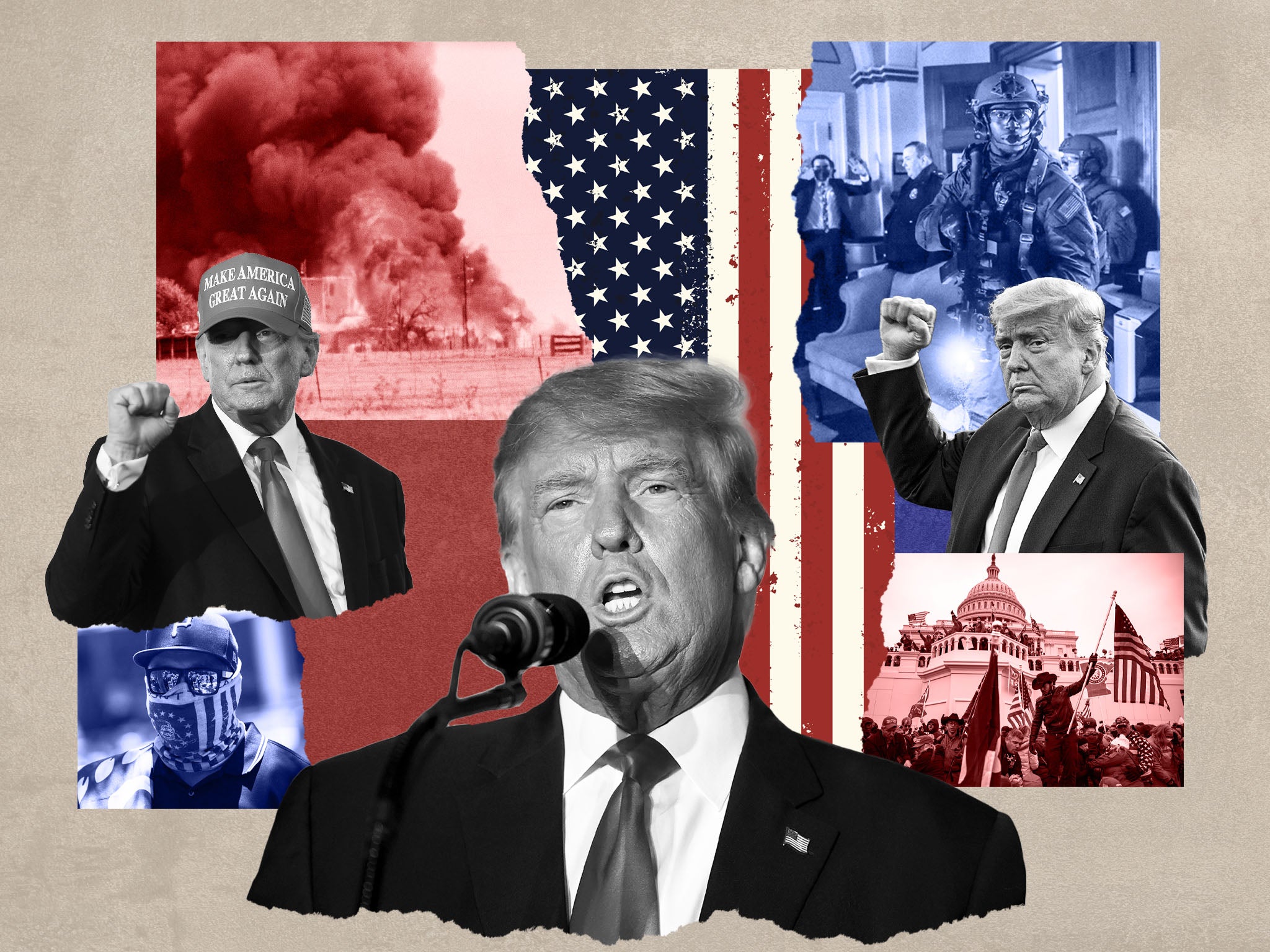
Your support helps us to tell the story
From reproductive rights to climate change to Big Tech, The Independent is on the ground when the story is developing. Whether it's investigating the financials of Elon Musk's pro-Trump PAC or producing our latest documentary, 'The A Word', which shines a light on the American women fighting for reproductive rights, we know how important it is to parse out the facts from the messaging.
At such a critical moment in US history, we need reporters on the ground. Your donation allows us to keep sending journalists to speak to both sides of the story.
The Independent is trusted by Americans across the entire political spectrum. And unlike many other quality news outlets, we choose not to lock Americans out of our reporting and analysis with paywalls. We believe quality journalism should be available to everyone, paid for by those who can afford it.
Your support makes all the difference.As he enters his 2024 presidential campaign, Donald Trump faces a looming potential indictment in New York, another set of potential charges in Georgia, and other possible criminal charges from a federal special counsel investigation. Meanwhile, a former GOP ally continues to pose a significant threat to his Republican presidential primary election in 2024.
The former president has demanded that his supporters protest and “TAKE OUR NATION BACK!” from what he calls the “CORRUPT & HIGHLY POLITICAL” Manhattan district attorney investigation, but so far only a handful of demonstrators have rallied to his defence at small events in Florida and New York.
Mr Trump, cornered by several investigations and predicting his own arrest in at least one of them, will hold his first 2024 presidential campaign rally in the city of Waco, Texas – in the middle of the 30th anniversary of the deadly 51-day siege that galvanised the far right and set the stage for the modern militia movement.
Following the attack on the US Capitol on 6 January, 2021, extremism researchers have traced predictions from the former president and his supporters of violence and dysfunction, with ideological echoes of the infamous 1993 federal law enforcement standoff near the same Texas town where Mr Trump has steered his campaign.
“Given what happened on January 6, he’s playing with fire,” professor Matthew Dallek, a political historian of the right and homeland security issues at George Washington University, told The Independent.
“His social media posts have made violence, even if it’s by a lone individual, more likely,” he added. “He’s weaponised his bull horn.”
For some, the fact that the former president is ushering in this new phase of his political life in Waco is a parallel too notable to ignore. The city was seared into the history books of the far right in 1993, when a militarised standoff between federal agents and the Branch Davidian religious sect in nearby Elk, Texas claimed the lives of more than 80 people, some of whom died by gunshots and others by a fire which broke out in the Mount Carmel compound.
The event partly inspired Oklahoma City bomber Timothy McVeigh to attack two years later, and for those on the militant fringe of American life, Waco came to serve as a symbol of violent government overreach or the beginning of the end times.
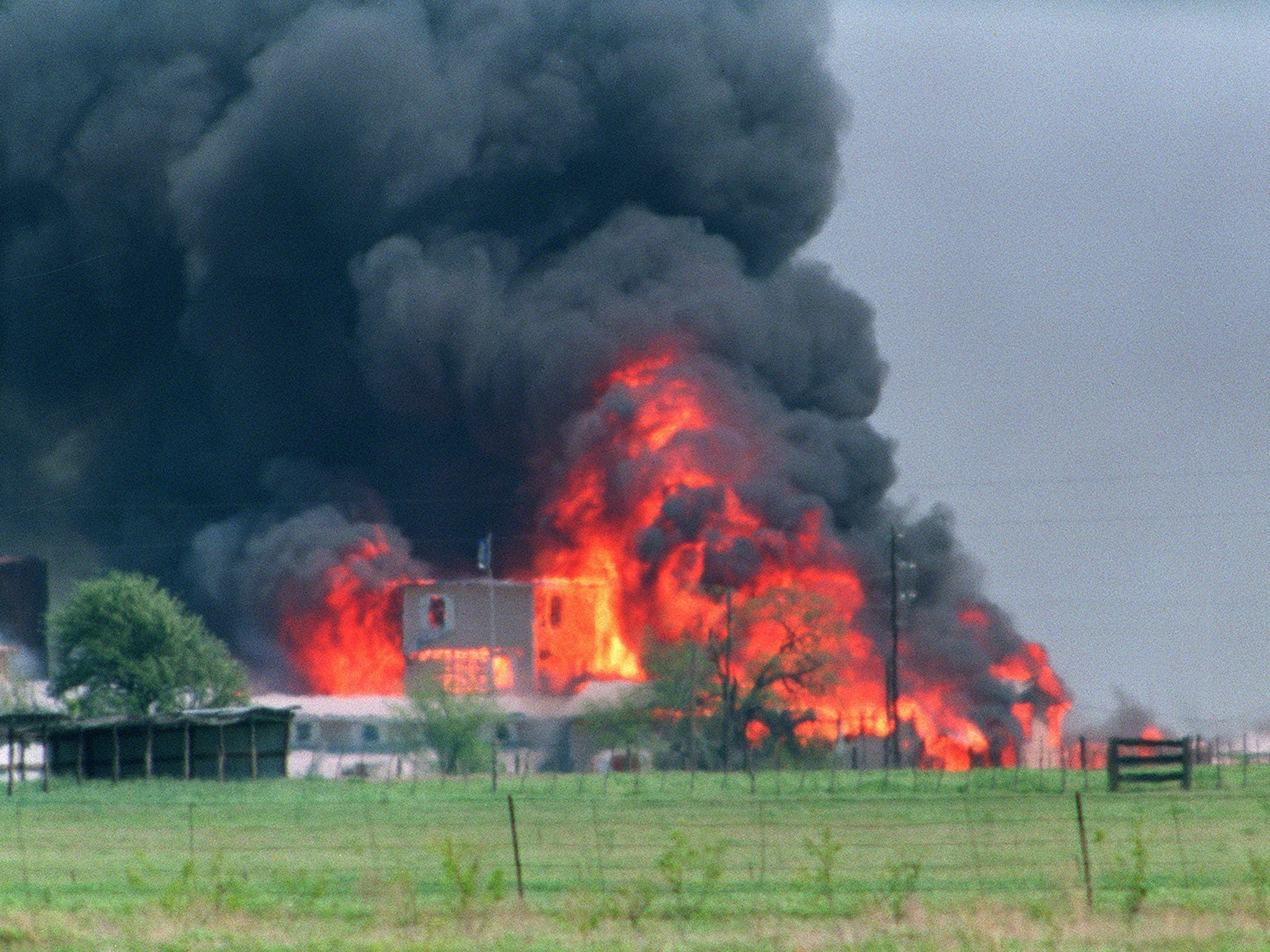
Far-right anti-government militia groups have repeatedly referenced the deadly event in their missions, conspiracy theorist Alex Jones began his career following the galvanising effect of the siege not far from his home in Austin, and longtime Republican strategist and far-right activist Roger Stone dedicated his 2015 book The Clintons’ War on Women to the Branch Davidians who died at Mount Carmel.
“By Trump going to Waco, he’s clearly aligning himself with this idea of, we are now at a turning point moment, and it’s a turning point towards violence that Waco signifies so clearly,” Robert Pape, a longtime researcher of terrorism and political violence at the University of Chicago who has performed wide-ranging studies on the Trump movement and January 6 attacks, told The Independent.
Waco’s legacy is one of a “deep source of distrust and hatred toward the federal government,” Katie McCarthy, associate investigative researcher at the Anti-Defamation League’s Center On Extremism, told The Independent.
Mr Trump’s decision to hold a rally there “can certainly be interpreted as a dog whistle” to the anti-government movement, she said.
In recent weeks, Mr Trump has repeatedly painted a darkly pessimistic picture of America, warning his followers that the country will enter World War III if he is not elected, and vowing “retribution” against political opponents if he is.
And on 23 March, he suggested there would be “death and destruction” if he is criminally prosecuted.
His critics have readily pointed out that Mr Trump’s vision of an us-versus-them future, one in which he promises to punish his political enemies and govern only on behalf of his loyalists, has all the hallmarks of fascist rhetoric: invoking a glorious past and an apocalyptic future; villainizing journalists and the people who hold power to account; appealing to conspiracy theories as the source of his problems; and promoting a “law and order” solution to solve them.
During his headlining appearance at the Conservative Political Action Conference in March, he pledged to be “your warrior” and “your justice,” vowing to his supporters: “And to those who have been wronged and betrayed, I am your retribution.”
“You’re going to have World War III, if something doesn’t happen fast,” he said during his speech on 5 March. “This is the final battle. They know it. I know it. You know it. Everybody knows that this is it … Either they win or we win. And if they win, we no longer have a country.”
His rhetoric has become “more and more incendiary and more extreme over time” following the FBI search of his Mar-a-Lago property in August 2022, Ms McCarthy with the ADL told The Independent.
His supporters, meanwhile, have offered him a feedback loop of support, with QAnon-aligned supporters and influencers latching on to his every word and sharing their reactions, which Mr Trump then broadcasts to his Truth Social following, which then reaches other platforms and mainstream press.
It’s a volatile political current that’s clearly developing beyond just the Trump campaign stage, according to Mr Pape’s research. A nationally representative January 2023 survey from the Chicago Project on Security and Threats suggested 6 per cent of Americans, or 15 million people, believe force is justified to keep Donald Trump from being prosecuted, with twice that many saying they couldn’t make up their mind.
For its part, the Trump campaign has said the choice of Waco was about electoral strategy, not esoteric symbolism.
“President Trump is holding his first campaign rally in Waco in the Super Tuesday state of Texas because it is centrally located and close to all four of Texas’ biggest metropolitan areas – Dallas/Ft Worth, Houston, Austin, and San Antonio – while providing the necessary infrastructure to hold a rally of this magnitude,” the Trump campaign said in a statement to TIME. “This is the ideal location to have as many supporters from across the state and in neighboring states attend this historic rally.”
Even if he’s not intentionally evoking Waco’s history, the resonance is hard to ignore, according to University of Hartford historian Professor Robert Churchill, author of To Shake Their Guns in the Tyrant’s Face: Libertarian Political Violence and the Origins of the Militia Movement.
“Trump and the far-right generally have turned against federal law enforcement, see the FBI as corrupt, the Justice Department as corrupt,” Mr Churchill told The Independent. “Waco is certainly a movement that fits into that same narrative.”
Others suggest that for all of his worrying talk, Mr Trump no longer has the magnetic influence over a sprawling base he once did.
His volcanic style, and some of his endorsed candidates, may still be well-represented on the national political scene, but national Republicans have coalesced around targeting LGBT+ people and public school curricula while absorbing some of Mr Trump’s tactics without having to defend him at all.
“It’s sort of a tough spot for him to be in,” said Shane Burley, who covers the right in America and is the author of Why We Fight: Essays on Fascism, Resistance, and Surviving the Apocalypse.
“There’s a certain lack of gravitas to the on-the-ground movement. Partly because it’s been taken by DeSantis, partly because they have critical race theory and drag queens to unify them,” he told The Independent. “They don’t necessarily need Trump anymore. The more radical wing of his base have abandoned him and don’t want anything to do with him.”
With his Truth Social, the former president lacks the gargantuan social-media megaphone he once possessed to instantly reach millions of people, but he has leveraged the platform to make bombastic statements that generate media attention and generate days of free press for his campaign.
Conspiracy theorists still believe Mr Trump is at the centre of a tangled web of Democratic corruption, but that belief doesn’t seem to be sending people into the streets.
Prominent QAnon influencers, Trump loyalists, Christian nationalists and civil war accelerationists – including figures who were once central to the “Stop the Steal” effort that fuelled the crowds before the riot in the halls of Congress two years ago – have expressed some sceptism over the former president’s latest demands, or have refused to participate in his defence at all.
Others believe that any “protest” would be seized by federal authorities to create a violent scenario that would lead to their arrest, or that a “deep state” is preparing to assassinate Mr Trump, according to a report compiled by Logically, which analyses mis- and disinformation using artificial and expert intelligence, provided to The Independent.
Far-right extremists also believe that any news of an imminent indictment – which was “leaked” by the former president himself – would be a kind of “false flag” event to distract from a global financial collapse or other newsworthy event, including failed Arizona candidate for governor Kari Lake’s ongoing challenge to her election loss, Logically found.
A post from a prominent right-wing influencer on Telegram with more than 173,000 subscribers claimed that Mr Trump’s potential indictment is part of an ongoing “Distraction War”, a claim that has been viewed tens of thousands of times, according to Logically.
Another prominent Twitter user with more than 678,000 followers made a similar claim about imminent bank failures, which has been shared more than 10,000 times.
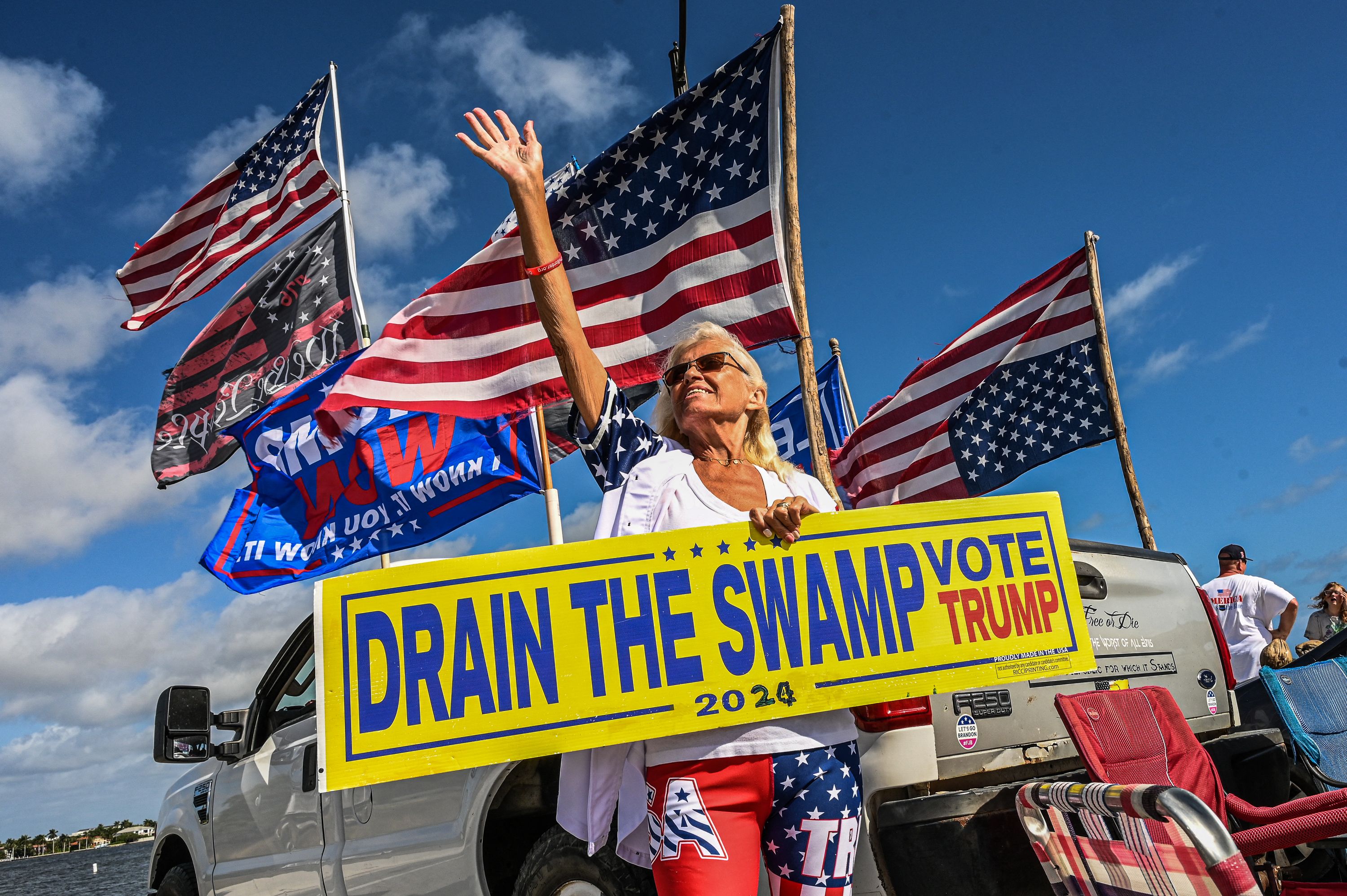
Following the hundreds of arrests of people connected to the attack on the US Capitol, a violent event that many right-wing conspiracy theorists believe was instigated by federal agents, Trump supporters appear sceptical to demonstrate their support under a fear that they would face similar consequences by demonstrating against his criminal prosecution.
Users on far-right platforms like “Telegram, Rumble, Gab, Gettr, Truth Social, and websites like the Gateway Pundit, have expressed caution about protesting a potential Trump indictment for this reason,” according to Logically.
“Users on the aforementioned platforms are continuing to amplify claims that a possible Trump indictment has been designed to distract from stories about bank failures and the upcoming pending US economic struggles on the horizon,” the report found.
The central message among his supporters, despite his demands that they take to the streets to defend him, is to “stay home,” according to Ms McCarthy.
Many supporters are gripped with “paranoia and fear stemming from January 6 as some sort of ploy from the deep state to arrest Trump supporters,” she told The Independent.
“Those conspiracy theories didn’t go away. They’ve only continued to grow,” said Ms McCarthy, noting that a narrative suggesting federal authorities instigated the Capitol siege has reached Fox News and Republican lawmakers in Congress.
“That paranoia is a large part of why we’re not seeing the protests he’s calling for,” she said. “People are angry, they’re upset about this, but for the most part I don’t foresee any kind of mass protest happening anywhere near what we saw on January 6.”
Mr Trump’s apparent attempts to provoke his followers have drawn only small crowds, but threats of extremist violence cloud a volatile political landscape heading into 2024. All extremist-related murders in 2022 were committed by right-wing extremists, according to reporting from the Anti-Defamation League. High-profile ideologically driven attacks, including the hammer attack against Paul Pelosi and mass murders in Buffalo and Colorado, continue a worrying trend of extremist-linked violence.
As Mr Pape at the University of Chicago notes, political violence only requires a motivated few to move from rhetoric to reality, especially when they know their views are shared by others.
“We’ve seen this in our country,” he said. “Seven per cent of George Floyd protests turned violent. They were mostly peaceful. About 5 per cent of those who went to the [US Capitol] Ellipse on January 6 turned violent. That’s still mostly peaceful. But mostly peacful is not the same as peaceful.”
What makes it all the more worrying is that these calls to action are hiding in plain sight, according to some observers. Donald Trump often uses just enough innuendo and suggestive language that a radical follower could be inspired to violence, while avoiding the kind of direct incitements that would invite legal scrutiny, according to Georgetown University professor Daniel Byman.
“What he’s doing is calling out his opponents and the system as fundamentally illegitimate,” he told The Independent. “If you’re a true believer and you accept this, it’s not surprising you would be very angry. He’s saying the system will not provide you justice.”
The Independent has contacted the Trump campaign for comment.
It remains to be seen how Mr Trump’s violent claims will impact his electoral fortunes, and the Republican party at large, but according to Mr Churchill, the former president has already made a shocking impact: bringing ideas once on the far-right of American politics, only uttered by people who saw Waco as a call to arms, into the centre of political life.
Waco and its aftermath, he said, “was always more important to the degree to which their ideas were being addressed by local levels of the mainstream right and the Republican Party.”
“What was important was what sorts of things were being talked about in Republican committee meetings in a small town in Texas.”
Now, discussions of political violence, conspiracy theories and the end of days have moved all the way to the halls of Congress. Waco may be a fading memory to some, but its ghosts linger.
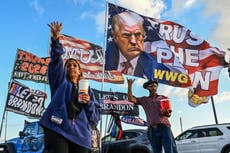



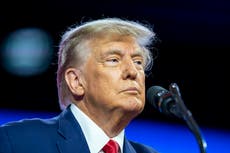

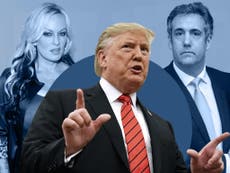


Join our commenting forum
Join thought-provoking conversations, follow other Independent readers and see their replies
Comments